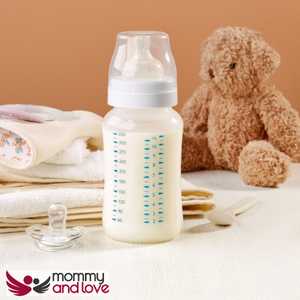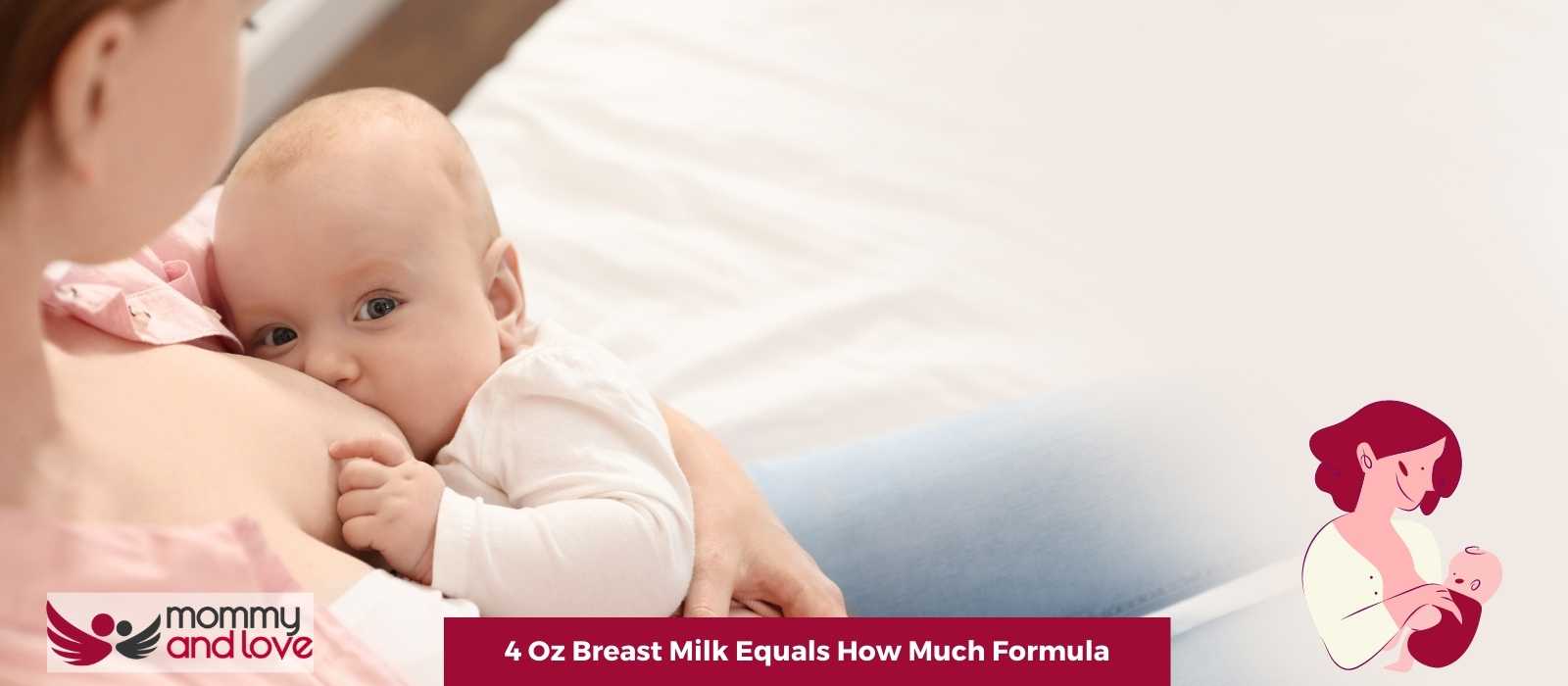When it comes to feeding your growing baby, there are a lot of choices to make. One of the most important decisions is whether to breastfeed or use powdered formula.
There are pros and cons to both choices, but in this blog post, we will focus on how much 4 oz of breast milk equals in a formula.
Breastfeeding has many benefits for both mom and baby, but sometimes it is not possible for one reason or another.
If you decide to use formula, it is important to know how much to give your baby so they get the right amount of nutrients.
How Many Ounces of Formula Is Equivalent to Breast Milk?

As breastfeeding mothers, you may be wondering how much formula you need to give your baby.
A baby should be getting 78 ml or 2.6 oz of breast milk per feeding (when converting, don’t forget to add those extra ounces). Remeber that one pound is equal to 16 ounces.
The ounces of formula your baby needs will depend on the baby’s weight and age. For instance, a baby who weighs 8 lbs should be fed with at least 90 ml or 3 ounces of breast milk per feeding.
Keep in mind that 4 oz of breast milk is equal to two scoops of formula with 4 ounces of warm water.
However, it is important to note that breast milk is more easily digested than formula during feedings so your baby may not need as much feeding formula as breast milk. Some formula brands include how many scoops you should use in each feeding.
If you have any questions about how much formula your baby needs, be sure to talk to your baby’s pediatrician. They will be able to give you the best advice for your child’s individual needs.
| The Amount of Formula You Want | Water | Scoops |
| 2 oz | 2 oz | 1 |
| 4 oz | 4 oz | 2 |
| 6 oz | 6 oz | 3 |
How Often Should You Feed Your Baby Each Day?
As a new parent, you may be wondering how often you should be feeding your baby each day. The answer is that it depends on your baby’s age and appetite.
From birth to 4 months, infants will typically feed every two to three hours (eight times a day). However, some babies may feel hunger more often and will need to be fed on-demand. If you are unsure whether or not your newborn is hungry, it is always best to err on the side of caution and offer a feed.
It is also important to remember that every body of a newborn is different and will have different feeding schedules. Some babies may need to feed more often than others, so it is important to pay attention to your baby’s feedings, and cues and feed them accordingly.
You should take note of how often your baby feels hungry in a day so that you create and prepare a feeding schedule that is best for your child’s individual needs. And it’s equally important to maintain enough breastmilk to continue breastfeeding.
How Much Milk Should Breastfed Babies Drink Each Day?

The answer can vary depending on the age of your baby. It’s important not to waste a single drop of your highly nutritious breastmilk.
For babies, ages one month and six months, the American Academy of Pediatrics (AAP) and Center for Disease Control and Prevention recommend 25 ounces, or 750 milliliters, per day. This amount will vary depending on your baby’s individual needs.
If you have any concerns about how much milk your baby is feeding, be sure to talk to your pediatrician or lactation consultant. They can help you determine if your baby is feeding enough milk and offer guidance on how to increase their intake if needed.
Is Formula Feeding More Filling Than Breast Milk?
It’s a question that many new parents ask themselves, and one that doesn’t have a simple answer. Both breast milk and formula can be nutrient-rich and filling for a baby, but there are some key differences between the two.
Here’s a closer look at breast milk vs. bottle formula, in terms of nutrition and satiety:
- Breast milk is more easily digested than bottle formula, meaning that the baby may be hungry more often. However, breast milk also contains more fat and calories than bottle formula, so the baby will feel fuller for longer after eating.
- Formula is less likely to cause gastrointestinal issues like gas and constipation than breast milk. However, it can be more difficult for the baby to digest, leading to hunger sooner.
- Breast milk contains antibodies that help boost a baby’s immune system, while the bottle formula does not.
So, which is better? Ultimately, it comes down to what works best for you and your baby. If you’re breastfed and the baby is gaining weight and seems satisfied, then there’s no need to switch to bottle formula. But it’s highly recommended to offer baby breastmilk whenever possible.
However, if you’re bottle formula-feeding and the baby is always hungry or seems fussy, it may be worth trying a different brand or variety. Talk to your pediatrician or medical professional to see if switching bottle formulas makes sense for your little one.
Is It Okay to Mix Breast Milk and Formula Together for Formula Fed Babies?
The answer is yes, you can mix breastmilk and formula together. However, there are a few things to keep in mind when doing so.
First, it’s important to understand that breastmilk and formula are not interchangeable. They are two different types of milk, designed to meet a child’s specific nutritional and health needs. So, while you can mix half and half breastmilk with warm milk together, it’s important to know that your baby will still need to consume both breastmilk and bottle formula in order to get all the nutrients they need.
Second, when mixing an equal amount of breast milk and bottle feed formula together, it’s important to do so in the right proportions. The general rule of thumb is to mix two parts of breast milk with one part of the formula for bottle feeding.
However, this ratio can vary depending on your child’s individual health needs, so it’s always best to check with your pediatrician before mixing the two types of milk together.
Finally, when mixing breast milk and infant formula together, it’s important to use freshly expressed milk per feeding. Breast milk that has been stored for more than 24 hours should not be mixed with bottle formula, as it may no longer be fresh and nutritious enough for your breastfed baby.
Do You Give the Same Amount of Formula as Breast Milk?
Most new parents worry about whether they are giving their baby enough breast milk or formula. It is important to remember that every baby is different and will eat differently.
Breastfed babies typically eat less than formula-fed babies because breast milk is more easily digested. This means that they need to eat less often. Breast milk also contains more nutrients than formula, so breastfed babies tend to gain weight more slowly.
If you are concerned that your baby is not getting enough breast milk, talk to your doctor or a lactation consultant. They will be able to help you determine if your baby is getting enough to eat and offer suggestions on how to increase your milk supply if necessary.
Remember, every baby is different, so trust your instincts and don’t be afraid to ask for help.
Do Babies Drink More Than 4 Ounces of Breast Milk Daily?
There’s a lot of controversy surrounding how much breastmilk babies should drink. Some say that anything over four ounces is too much, while others believe that babies can and should drink as much as they want. So, what’s the truth?
The answer is that there is no one-size-fits-all answer to this question. Some babies will drink more than four ounces of breastmilk, while others will drink less. It all depends on the individual needs. Regardless, breastfeeding moms should have a steady milk production and even maintain more milk for the needs of their babies.
Does Supplementing With Formula Reduce the Benefits of Breastfeeding?
It’s a question that many parents ask, and there isn’t a simple answer. Some experts say that supplementing with formula bottles can reduce the benefits of breastfeeding, while others say it depends on the circumstances.
So what’s the truth? Let’s take a look at what the research says.
One study found that supplementing with formula can reduce the benefits of breastfeeding, including the transfer of immunity and protective factors. They also found out that the supplementation caused nipple confusion and shorten the duration of breastfeeding.
However, another study found that supplementing with iron-fortified formula does not reduce the overall benefits of breastfeeding.
So what do we make of these conflicting findings? It’s important to remember that every child is different, and there is no one-size-fits-all answer. What works for one family may not work for another.
Conclusion
In conclusion, how much breast milk or formula a baby needs or how many feedings happen in a day depends entirely on your baby’s weight, age, feeding habits, and other factors. It’s important to observe and take note of your baby’s feeding schedule so that make the necessary preparations and decisions that are suitable to your child’s needs.

This article was written by Sandra Baker – full time writer and the mother of four amazing kids (including twins!)
She’s also a breastfeeding counselor and has spent years helping new parents learn how to care for their children. When she’s not writing or caring for her children, Sandra likes to spend time reading and taking walks with her husband.




